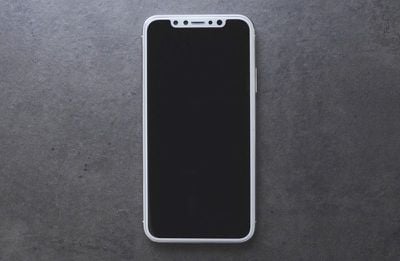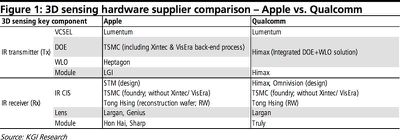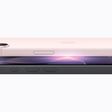Apple's progress in 3D sensing design and mass production is 1.5 to 2 years ahead of Qualcomm's, according to a new investor's note released today by KGI Securities analyst Ming-Chi Kuo.
Kuo believes that Qualcomm is behind in both software and hardware development for 3D sensing, and won't be able to ship the technology until 2019. As Qualcomm is the "most engaged" company when it comes to 3D sensing components for Android devices, Android smartphones could lag behind Apple devices for some time.

While Qualcomm has excelled in designing advanced application processors and baseband solutions, it lags behind in other crucial aspects of smartphone applications like dual-camera (many Android phones have instead adopted solutions used to simulate optical zoom from third-party vendors such as Arcsoft (US)) and ultrasonic fingerprint scanner (while a new reference design has been released, there is no visibility on mass production). So while Qualcomm is the most engaged company in the R&D of 3D sensing for the Android camp, we are conservative as regards progress toward significant shipments and don't see it happening until 2019F.
According to Kuo, Qualcomm is dealing with immature algorithms and an unfavorable hardware reference design for smartphones due to form factor design and thermal issues. Qualcomm may also be impacted by Apple's choice of suppliers. Many key component suppliers have already allocated resources to Apple, so Qualcomm has to find different suppliers in order to obtain sufficient resources. Kuo also outlines the suppliers each company is using:

In general, Kuo says the "Android camp" appears to be taking a wait-and-see approach to 3D sensing, which also does not bode well for Qualcomm's 3D sensing technology. Android manufacturers are said to be waiting to see how Apple will use 3D sensing and whether it will offer an "innovative user experience" with features like facial recognition.
Xiaomi's 2018 flagship device is said to be the only potential adopter of Qualcomm's 3D sensing technology, and if the OLED iPhone doesn't see positive feedback following launch, Kuo believes Xiaomi may drop the project.
Apple is rumored to be introducing a front-facing camera with 3D sensing functionality that will enable a new facial recognition system to replace Touch ID, which the company could not build under the display of the device due to production issues. Apple's "iPhone 8" with 3D sensors is expected to debut in just a couple of weeks.



















Top Rated Comments
But to answer your question: infrared. Doesn't matter how pitch black it is, infrared will be able to detect your face. Some smartphones/laptops already have this I believe.
I'm not saying you're wrong since no one knows for sure, but your logic is definitely flawed... especially since Samsung has a poor track record with security; their iris scanner was recently hacked, for example, and their face detection was hacked almost immediately.
Clothing covering part of your face.
Hair covering part of your face.
Various types of glasses/sun glasses.
Facial jewelry being there or not.
Of course it won't work at all if you have some kind of halloween costume / makeup on.
Going to be interesting to see.
It's got to be both:
Lax enough not to be a pain and keep rejecting things YOU do.
Yet secure enough to not pass someone/something that looks like you.
That's a tricky combination to pull off.